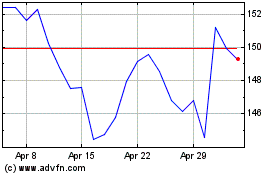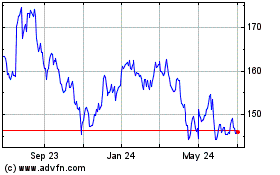By Greg Ip
On Tuesday, regulators recommended pausing the rollout of
Johnson & Johnson's Covid-19 vaccine out of "an abundance of
caution" after six out of nearly 7 million recipients developed
dangerous blood clots.
For one of the regulators, the U.S. Food and Drug
Administration, the decision was entirely in character: it has
always put a premium on safety. That doesn't necessarily make it
the safe choice. Covid-19 infects more than 60,000 Americans and
kills more than 900 every day. A pause of even a few days could add
to that toll.
"It's very clear that the dangers of Covid are much larger than
the dangers of the J&J vaccine or the AstraZeneca vaccine for
that matter," said Alex Tabarrok, an economist at George Mason
University who has advocated for bolder approval and distribution
of vaccines. "I worry that the public will confuse a pause to mean
that the FDA thinks people shouldn't take the J&J vaccine."
It's too soon to know the ultimate net effect of the pause on
health. Still, Britain kept administering AstraZeneca's vaccine
when similar blood clotting was reported and the evidence so far
seems to back it up.
The Winton Centre for Risk and Evidence Communication, based at
the University of Cambridge, estimates the virus is a much bigger
risk than blood clots to recipients of almost all ages and
exposures. In every 100,000 people in their 40s with low exposure
to the virus, the vaccine will cause blood clots in 0.5 while
preventing Covid-19 serious enough to require intensive care in six
others, it says. Among people in their 60s with high exposure, the
vaccine would cause blood clots for 0.2 while preventing an ICU
visit for 128. Only for people in their 20s with low exposure did
it find risks are roughly equal. British regulators have advised
that people under 30 be offered a different vaccine.
This doesn't necessarily mean the FDA is wrong. It may simply
use the pause to develop more detailed guidance for at-risk
recipients, and meanwhile vaccines by Pfizer Inc. and Moderna Inc.
are readily available.
Still, it's the latest example of how Americans have struggled
to be rational about risk throughout the pandemic. The unknowns
about the virus were bound to make decisions error-prone. Emotion,
misinformation and polarized politics make rational cost-benefit
analysis even harder.
For example, ample evidence shows masks significantly reduce
transmission at little economic cost, yet some Republican governors
have refused to enact or maintain mask mandates. Evidence similarly
shows schools with mitigation measures don't worsen the spread of
the virus and remote learning is hugely costly to children and
families. Yet until recently many predominantly Democratic leaders
have kept children out of class.
The FDA and the U.S. Centers for Disease Control and Prevention,
though generally more faithful to science and statistics than
politicians, often default to the "precautionary principle" --
erring on the side of safety when science is at all uncertain. This
is sometimes traced to the 1960s, when the FDA was praised for not
approving thalidomide, a drug for morning sickness that turned out
to cause birth defects.
That has resulted in what Mr. Tabarrok calls an "overabundance
of caution." In the past, people died from preventable diseases
because the FDA was slow to approve treatments, he said.
"Throughout this crisis, we have acted too slowly and been too
cautious."
Mr. Tabarrok, like many experts, has urged the U.S. to postpone
the second of the Moderna and Pfizer vaccines' two shots so that
more people get at least one. They argue that while each individual
would have slightly less protection, the country as a whole would
reach "herd immunity" faster, saving countless lives. But U.S.
regulators have stuck with the two-shot regimen, because approval
was based on the durable immunity the two-dose regimen demonstrated
in trials.
Britain decided in December to delay the second of its vaccines'
recommended two shots. As a result it has vaccinated more of its
population than any major country except Israel, and its infection
rate has gone from among the highest in the developed world to
among the lowest (a lockdown helped).
Since early in the pandemic, some epidemiologists have pushed
for rapid, cheap Covid-19 antigen tests that, while less accurate
than better-known PCR tests, could be administered at home en
masse, catching enough infections to halt transmission and allow
schools and businesses to reopen. But the FDA has been slow to
approve them, undermining their potential. The FDA has also yet to
approve AstraZeneca's vaccine despite approval in many other
countries. This month, the CDC declared it was safe for vaccinated
people to travel, while advising them against doing so. Critics say
such guidance diminishes the incentive to get vaccinated.
Yet set against its history, the FDA actually has moved
relatively quickly. Robert Wachter, chair of the department of
medicine at the University of California, San Francisco, notes it
granted all three Covid-19 vaccines "emergency use authorization,"
which it seldom did for vaccines in the past.
He said the authorization ensured millions of people could
receive the J&J vaccine a year or two sooner, while monitoring
continued for side effects that are too rare to show up in trials
-- such as the blood clots. "We are seeing...the system working
magnificently well."
Alexandra Freeman, executive director of the Winton Center, said
willingness to get vaccinated depends less on numbers than on
trust: "You can't personally see the benefits, so you have to trust
somebody else. Imagine you were offered the Chinese, or North
Korean or Russian vaccine: would you put your arm out and say yes?
You might think twice." Blood clot reports don't appear to have
reduced Britons' vaccine take-up, possibly because they trust the
regulators, she said.
Trust may thus justify the pause in J&J's vaccine rollout,
even if raw cost-benefit calculus does not. By showing they would
act on any evidence a vaccine is unsafe, regulators hope the public
will believe them when they say a vaccine is safe.
Write to Greg Ip at greg.ip@wsj.com
(END) Dow Jones Newswires
April 14, 2021 11:09 ET (15:09 GMT)
Copyright (c) 2021 Dow Jones & Company, Inc.
Johnson and Johnson (NYSE:JNJ)
Historical Stock Chart
From Mar 2024 to Apr 2024

Johnson and Johnson (NYSE:JNJ)
Historical Stock Chart
From Apr 2023 to Apr 2024
